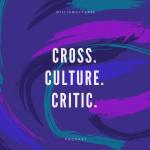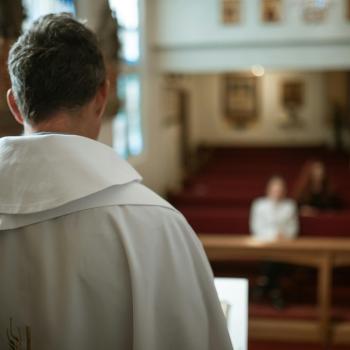
It takes a lot to turn off the new album by your favorite artist one song in, but that’s what happened the first time I heard Derek Webb’s “Fingers Crossed.”
The album, released last fall, chronicles the singer’s recent turmoils, including the dissolution of his marriage and the loss of the faith that once fueled his albums. He’s described it as “a tale of two divorces,” and it’s a wrenching listen, often sad, sometimes angry, at times defensive.
Webb seemed to know this was going to be his separation with the Lifeway crowd. On his first song, “Stop Listening,” he addresses his audience, thanking them for their continued support and acknowledging the changes he’s undergone. Perhaps anticipating the feedback from the Reformed community that had long championed his work, he switches perspective in the second verse:
i mean unless you climb down from the cross
but in the end we’ll grieve a brother lost
and if you stop listening now
we’ll know we were right
’cause cash can’t buy a jealous eye
With that verse, I was done with the song and the album. I turned it off and moved on, ready to say goodbye to a singer whose music I’d once described as “keeping me sane” (a line I cribbed, as a matter of fact, from his description of Bob Dylan). He said I could stop listening; I was going to.
Months later, I would give the album another shot with different eyes. But before that, I think it’s helpful to look back at Webb’s career, why his music has long meant so much to me and why this new direction rattled me so much.
Soundtrack for my soul
I was in my early twenties when a youth pastor friend slipped me a copy of Caedmon’s Call’s “40 Acres,” and it changed my life. I’ve written before about the role Contemporary Christian Music played in my life — it was, for a long time, all that I listened to. But for most of my teenager years, most of what I listened to was the broadest and most popular Christian music, bands that aped popular culture and kept the theology broad.
Caedmon’s was different, and perfect for a college kid just taking his burgeoning steps into what would become a full-blown obsession with Calvinism. It was my first exposure to folk music, a genre that fit perfectly with a kid who spent every night in a coffee shop talking theology with his friends. The music was smart, blending not only Christian theology but also allusions to Greek mythology and a cover of a Shawn Colvin song.
But it was the album’s sixth track, “Table for Two,” that hit me the hardest. As a lonely single guy wondering why God hadn’t brought me a spouse yet, this musing on late-night conversations, singleness and sovereignty became my anthem. It was a beautiful, unassuming piece of poetry that still conjures memories of sitting up until 2 a.m. in a coffee shop, whining about my inactive dating life and faith in God to bring me someone in his time.
A few years later, during a random Target run, I was perusing the Christian music section. I saw an album that caught my eye. A man in a white T-shirt stood, arms crossed, outside a small church. A sticker on the front proclaimed it was the solo debut of one of the frontmen for Caedmon’s Call and made comparisons to Rich Mullins. I was sold, picking it up without giving it a listen. I was not prepared.
“She Must and Shall Go Free” is still in constant rotation for me. It’s a love letter to the church, a bracing and at times confrontational album about living in community with other believers. The album’s standout track — and possibly Webb’s most famous song — is “Wedding Dress,” a lament about Christians’ tendencies to abandon faith for comfort and sell out the gospel for money. His use of the word “whore” was shocking — and kept the album out of many Christian bookstores — but necessary, an intentional jolt to the system that made me sit up and pay attention. The first time I heard the song, I had to pull the car over and play it again just to take it all in.
The album felt like it was deliberately engineered for me, a 24-year-old Calvinist firmly in the cage stage. It was a rallying call, an anthem, eleven tracks of theology and poetry. I was positively evangelical about it.
For awhile, Webb put out albums once a year and on every album he seemed to sing about the things I was wrestling with at the moment. As I eased out of my Calvinist phase and grew more concerned about the effects of subcultural Christianity, albums like “I See Things Upside Down” (his most underrated project) were there for me. As we engaged in the Iraq war and my politics began to shift more to the left, I turned to his political and protest albums, “Mockingbird,” “The Ringing Bell” and “Stockholm Syndrome.” Today, as our culture is mired in another existential crisis regarding the mixture of faith and religion, these albums have found their way back into rotation, perhaps more vital than ever.
Five years back, Webb embarked on a 10-year tour for “She Must and Shall Go Free,” followed quickly by a tour for “I Was Wrong, I’m Sorry and I Love You,” an album that seemed to reconcile with the first one and return Webb to the roots of many of the beliefs he previously sang about. It was an approach to faith that was warmer and less confrontational, a make-up album with the church community and a home that he returned to after years of searching for answers.
And then, things changed.
Changes and expectations
I was out to dinner with my wife when I saw a tweet directing me to Webb’s website. On the homepage was a message that Derek and his wife were getting a divorce; the message stressed that Derek had taken full responsibility for it.
Marital strife in the lives of artists and celebrities has never really affected me; I assume it’s a professional hazard, and none of my business. But this one bothered me. It angered me. I fumed over it for weeks and wrote an angry blog post about it, claiming that Christian artists should be held to a higher standard. I vowed not to listen to any more of his music.
The truth is I felt lied to. Webb had created an atmosphere of trust with his audience; many people’s first exposure to him was as a songwriter tackling things that no one else in Christian culture was questioning. He played small concerts in people’s living rooms and was active on social media. It gave an air of intimacy between him and the audience, and I’d heard him sing twice in a year about his wife and tell us stories about their marriage. I felt that we had been lied to by an artist known for truth.
Of course, I know how silly that is. Every artist, no matter how genuine, is putting on a performance on stage and in their music, showing their ideal self through the work, and no human being is immune from temptation — I probably often do the same through my writing. Should I expect more for a Christian artist? Perhaps I can hope they’re living up to the words they write, but I can’t hope for them to be any more immune from temptation than any of us, or any more human than anyone else in the audience. And while I would hope that artists professing some sort of faith would live up to it, a core tenet of our faith is that we’re all capable of sin and disappointment; why do we act surprised when someone sins and disappoints us? Why do we turn our backs on them when they’re doing what we know we’re wired to do?
The truth was that I was afraid. At the time, I’d been married less than three years, and marriage was harder than I thought. Was I capable of making the same mistakes as Derek? If his words had hit right where I lived for so long, how did I know I wasn’t headed down a similar path? What his actions revealed were less about him and more about how everyone — even our heroes — is susceptible to temptation and failure. I wasn’t safe (ironically, Christian culture’s love of safety has been a constant criticism of Webb’s).
Webb eventually discussed this in more detail on his Facebook site, and I appreciated his candor. I hoped this would be a return to music about faith and redemption. But listening to him on podcasts and social media over the years seemed to confirm he had no plans of coming back to the church and identifying as a believer. Anyone questioning that received their answer when he released his single “The Spirit Bears the Curse” just days before the release of “Fingers Crossed.” The song, which seems to be a standard worship tune for much of its runtime, takes an unanticipated twist near the end, revealing itself to be something much more. At the time, I read it as a provocation. As you’ll see, my thoughts on it changed.
But we’ll get there.
Listening with humility
So, we’re back to where we started, with me wondering how Webb’s new views would come out on his album. And we came to that first song, where he gives his longtime followers the opportunity to turn it off if they can’t follow him where he’s going.
I was upset. I felt like he was belittling those who cared for him, who wanted to see him return to the faith, who legitimately prayed for him. I felt like he was blithely shrugging off concern in favor of doing his own thing. And if this was what he was going to do, I didn’t want to be a part of it.
Months later, when I finally listened to the album through, I realized that’s not what he was doing.
“Fingers Crossed” is a raw album and as personal a project as Webb has put out. After a career of topicality and prophecy, even if he’s uncomfortable with those terms, it’s an album where he’s the subject. He doesn’t let himself off the hook; he admits he “f—ed up” in regard to his marriage and mourns the loss of that relationship. He sings about the loneliness of losing a community that once surrounded and encouraged him. Is he angry in places, yes? Mostly at those who would preach to him and try to urge him back as a cover for their own self-righteousness or love him with condition — only accepting him if he were to agree to believe something he no longer can. “The Spirit Bears the Curse” is not a provocation but a song aching for community, a worship song for those who have to gather at the bar when the church is no longer their home. But overall, “Fingers Crossed” is an album of deep loss and pain, the sound of a man looking around at a house he’s burned down and wondering whether it was worth it to grab that match.
I’ve listened to the album several times since, and it’s a hard listen. It’s heavy stuff, and I often find myself in a funk after listening to it. But I find myself ruminating on what shook me so much the first time, and I no longer think that it’s anger. I think it was, once again, fear. Because there are too many lines on this album that resonate, too many similar thoughts that have crept into my mind.
It’s no secret that since 2016 I’ve been in a process of deconstruction and reassessment. I’ve often felt frustrated and let down by Christians, and I’ve had to ask myself many hard questions about belief. When Webb compares our faith to Easter Eggs and questions whether mom is “just making it up,” I think about my own fears that one day my parents would reveal to me that we’d been following a lie to keep us in line the whole time. When he mourns a loss of community because of his doubts, I think about questions I’ve kept silent because I know that other believers wouldn’t respond kindly to them. When he sings “Either you’re not real or I am just not chosen,” it puts a lump in my throat because, in my darkest days of unbelief I’ve said the same thing. When he tells God “The reason it’s been so long since we’ve talked, I’m not ready to show up and feel nothing,” I realize I’ve also gone through periods of silence with God, wondering if I would feel anything again.
In the end, my journey has taken me to a different place than Derek (so far), a place of reconstruction that still holds to most of the core tenets of orthodoxy. But that doesn’t mean his album is any less resonant. It’s just that now, instead of listening to him as a prophet or using his lyrics as a rallying cry, I listen to an artist who tells me about his view of the world, which, as he points out, is his job. I can agree or disagree with him; all he asks is that I listen. I hope, as his final song states, that it’s simply “Goodbye for now,” but that’s not my decision to make; he’s not a project for me to save.
We listen to music passively so often or we use it for our own benefit; to pump us up, reaffirm us or change our feelings. But it’s harder to listen with empathy and engage with an artist’s difficult questions. I may be walking down a different road than Derek Webb, but I can still listen fairly and with empathy. If there’s anything I’ve learned over time, it’s that I don’t know where my journey will take me; I could be asking the same questions in 10 years. And so I’ll keep listening, even when the listening is hard.
Why I’m writing this
I’m writing this post as part of my Sacred Cows discussion, but there’s also another reason. I had the opportunity to see Derek at a house show recently in the Detroit area. While there, we briefly talked about the possibility of him coming on my podcast as a guest. I’m happy to say we recorded an hourlong conversation last week, and you’ll be able to hear it on Friday on the “Cross.Culture.Critic.” podcast. We talk about the risks of singing about doubt with faith is your “brand,” his new podcast “The Airing of Grief,” and what a Derek Webb punk album might sound like. I hope you’ll tune in.
Previous Sacred Cows discussions:
















